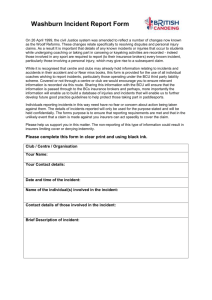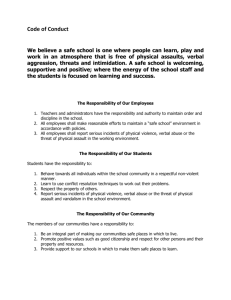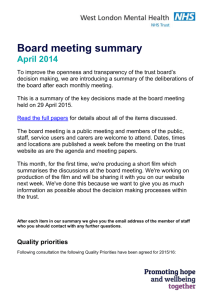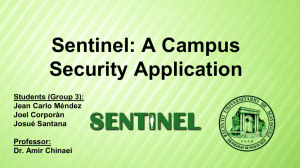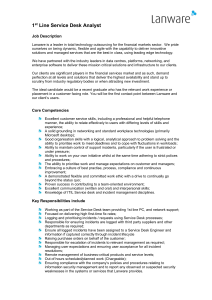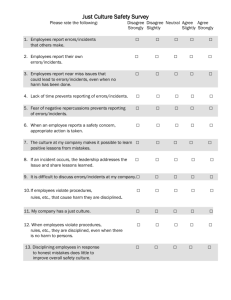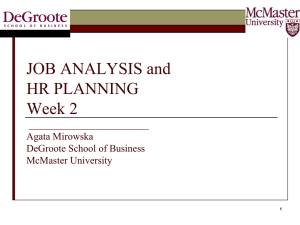Keeping Our Kids Safe at School
advertisement
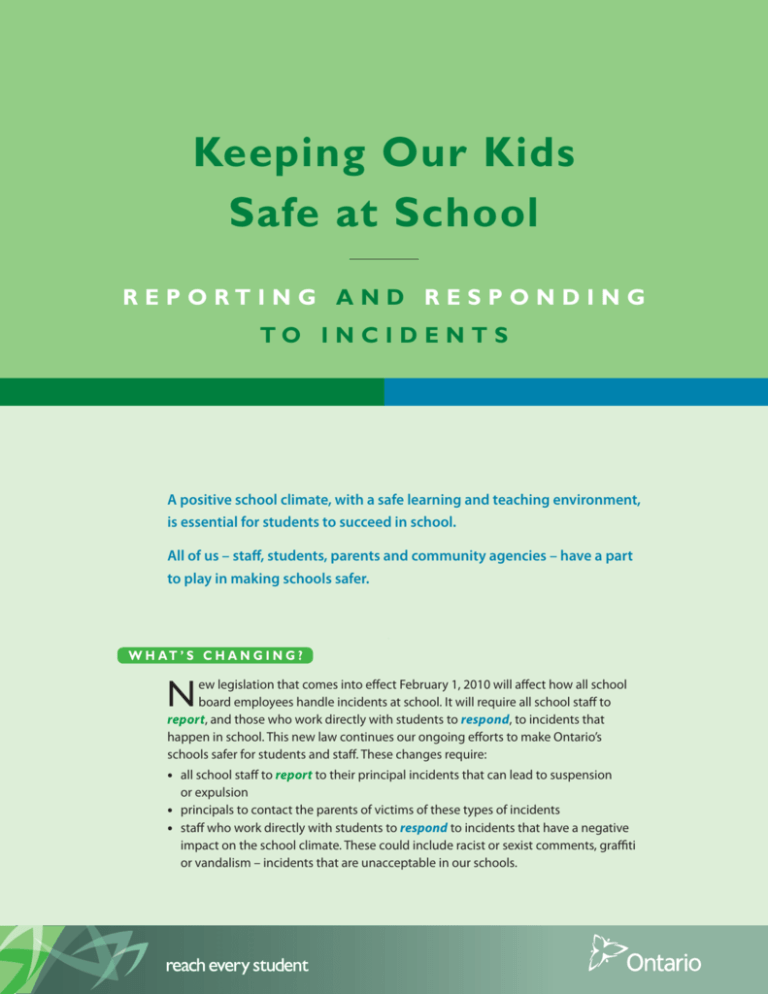
Keeping Our Kids Safe at School R e p or t i n g a n d R e s p o n d i n g to Incidents A positive school climate, with a safe learning and teaching environment, is essential for students to succeed in school. All of us – staff, students, parents and community agencies – have a part to play in making schools safer. W h at ’ s C h a n g i n g ? N ew legislation that comes into effect February 1, 2010 will affect how all school board employees handle incidents at school. It will require all school staff to report, and those who work directly with students to respond, to incidents that happen in school. This new law continues our ongoing efforts to make Ontario’s schools safer for students and staff. These changes require: • • • a ll school staff to report to their principal incidents that can lead to suspension or expulsion principals to contact the parents of victims of these types of incidents staff who work directly with students to respond to incidents that have a negative impact on the school climate. These could include racist or sexist comments, graffiti or vandalism – incidents that are unacceptable in our schools. 2 • Reporting R EP O R TING What types of incidents must be reported? The same types of behaviours that must be considered for suspension or expulsion must be reported. Student behaviours that can lead to suspension include: • Uttering a threat to inflict serious bodily harm on another person • Possessing alcohol or illegal drugs • Being under the influence of alcohol • Swearing at a teacher or at another person in a position of authority • Committing an act of vandalism that causes extensive damage to school property at the pupil’s school or to property located on the premises of the pupil’s school • Bullying • Any other activities identified in school board policy. Student behaviours that can lead to expulsion include: • Possessing a weapon • Using a weapon to cause or to threaten bodily harm to another person • Committing physical assault on another person that causes bodily harm requiring treatment by a medical practitioner • Committing sexual assault • Trafficking in weapons or in illegal drugs • Committing robbery • Giving alcohol to a minor • Any other activities identified in school board policy. These behaviours can lead to suspension or expulsion and must be reported when they occur at school, at school-related activities or off school property where it has a negative impact on school climate. Who has to report an incident? All school board employees are required to report in writing to their principal any incident that must be considered for suspension or expulsion. Board employees include: • • • • • principals vice t eachers and educational assistants all non-teaching staff, such as those involved in social work, child and youth work, psychology and other related disciplines administrative and custodial staff school bus drivers. Reporting • 3 What happens when an incident is reported to the principal? The principal determines what disciplinary action, if any, is required. If the incident leads to suspension, the principal will inform the parents or guardian of the suspended student. If another pupil was harmed, the victim’s parents or guardian will be called. What information is shared with the parents or guardian of the victim? The principal can tell parents or guardian about: • the incident • the harm their child suffered • what steps were taken to protect their child’s safety, including any disciplinary measures taken in response to the incident. The principal cannot name or provide any identifying information about the aggressor. Does the principal always call the victim’s parents or guardian? There are exceptions. A principal is not permitted to call the victim’s parents or guardian if: • the student is 18 years or older or is a 16- or 17-year-old student who has withdrawn from parental control • the principal believes that telling the parent(s) would put the student at risk of harm from the parent(s). Does the principal have to call the parents of the aggressor? A principal must call if the incident leads to a suspension. The Education Act already requires the principal to inform the aggressor’s parents within 24 hours of the incident. Parents also receive written notice telling them the reason for and duration of the suspension and outlining the appeal process. Who else must the principal call? Depending on the incident, police may be called. Principals must follow their local police/school board protocols when involving police. When board employees believe that a student may be in need of protection, they must continue to follow the usual procedure and call the children’s aid society as required by the Child and Family Services Act. If a student asks a teacher or other staff member not to tell anyone about an incident, does that board employee still have to report this to the principal? If it is an incident that could lead to suspension or expulsion and it happened at school or at any school-related event, then the teacher or any other staff member must tell the principal. If the incident occurred off school property and not at a school event, the teacher can direct the student to a community agency, such as the Kids Help Phone at 1-800-668-6868, which provides a 24/7 confidential counselling service. 4 • Reporting Are teachers required to report serious incidents that happen off school property? If a teacher or any other school staff learns of an incident that will have a negative impact on school climate and could lead to a student being suspended or expelled it must be reported. What happens if an incident is not reported? If a principal learns that any member of the school staff has not reported a serious incident that could lead to a student being suspended or expelled, the matter could be dealt with as a human resource issue, consistent with school board human resources policies and collective agreements. As well, all staff who hold teaching certificates, including teachers, principals and superintendents are governed by the Ontario College of Teachers Act, which sets out activities that are defined as professional misconduct and outlines sanctions. Supporting Victims School staff who work directly with students are required to support all students, including those who either instigate or are victims of serious student incidents. They will provide contact information about professional supports – such as public health units, child and youth workers, help phone lines – or other community agencies that offer the appropriate type of confidential support. This could include, for example, a sexual assault centre, Kids Help Phone or the Lesbian Gay Bi Trans Youth Line. Supporting All Students School staff who work directly with students will provide those students wishing to discuss such issues as healthy relationships, gender identity and sexuality with contact information about professional supports available in their community. Responding • 5 R E S P O NDING Responding to Incidents All staff who work directly with students must respond to incidents that will have a negative impact on the school climate. This includes principals and vice principals, teachers, educational assistants and other non-teaching staff, such as those involved in social work, child and youth work, psychology and other related disciplines. How will staff respond? Responding may include: • identifying the behaviour • asking the students to stop the inappropriate behaviour • explaining why it is inappropriate or disrespectful • asking the students to change their behaviour in future. What behaviour is not allowed? We can all help make it clear what behaviour is unacceptable and create an environment in our schools where students feel welcome. Examples of inappropriate and disrespectful behaviour include racist, sexual, sexist or homophobic comments, slurs and jokes or graffiti, as well as those activities and behaviours outlined on page 2 that can lead to suspension or expulsion. Must staff always respond? Staff must respond to all incidents, unless doing so would cause immediate physical harm to themselves, a student or any other person. In these cases staff are expected to report the incident to the principal as soon as it is safe to do so. L e a r n M or e Contact your school principal or school board to find out more or check out your school board website. Learn more about the Keeping Our Kids Safe at School Act and Ontario’s approach to making schools safer by visiting O nt a r i o. c a / s a fe s c h o o l s. 6 • Responding R e s p o n d i n g a n d R e p o rt i n g Who Must Respond All board employees, e.g. custodial staff, school bus drivers All staff who work directly with students, e.g. teachers X Types of Behaviour (examples) Must Report X • • • • Drinking alcohol Swearing Vandalism Possessing a weapon X • Offensive slurs/jokes • Graffiti • Racist/sexist or homophobic remarks • Drinking alcohol • Swearing • Vandalism • Possessing a weapon Responding to incidents All staff who work directly with students must respond to all student behaviour that has a negative impact on the school climate, unless doing so would cause immediate physical harm to themselves, a student or another person. Reporting incidents All board employees must report to their principals incidents that can lead to suspension or expulsion. ISBN 978-1-4435-1760-7 (Print) • ISBN 978-1-4435-1761-4 (PDF) © Queen’s Printer for Ontario, 2009

